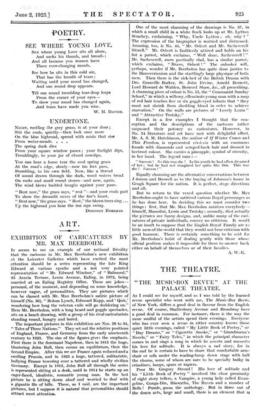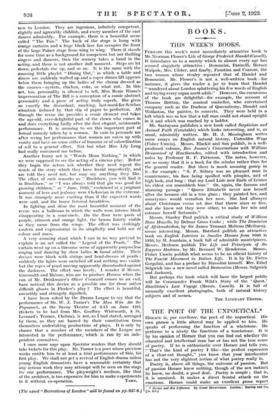THE THEATRE.
"THE MUSIC-BOX REVUE" AT THE PALACE THEATRE.
As I could see for myself, and as I was told by the learned revue specialist who went with me, The Music-Box Rerue, of New York, differs a good deal in flavour from the English revue. Of course, Shaftesbury Avenue and Broadway have a good deal in common. For instance, there is the way the more soulful of the artists spend their evenings. Everyone who has ever seen a revue in either country knows those quiet little evenings, called " My Little Book of Poetry," or " Day Dreams," or " Cigarette Smoke," or " Grandmarna's Novels," or " Fairy Tales," in which the principal character comes in and sings a song in which he asserts and reasserts his love for solitude. It is always a sad story, for in the end he is certain to have to share that comfortable arm- chair or sofa under the reading-lamp down stage with half the chorus, some of whom are sure to be specially bulky in crinolines, hoops, spurs or rapiers.
Poor Mr. Gregory Stroud ! His love of solitude and his " Little Book of Poetry " involved the close proximity of eight story tellers, a Vampire, a young lady called Evan- geline, Gunga-Din, Hiawatha, The Raven and a number of Bells ! Puzzle, guess the anthology. But in three out of the dozen acts, large and small, there is an element that is '
new to London. They are ingenious, infinitely competent, slightly and agreeably childish, and every member of the cast dances admirably. For example, there is a beautiful scene called " The Fan." The back of the stage is hung with orange curtains and a huge black lace fan occupies the front of the large Palace stage from wing to wing. There it stands for some time as a background for competent but not thrilling singers and dancers, then the scenery takes a hand in the acting, and there is not another dull moment. Steps are let down, pedestals rise up, and so on. It is the same with the amusing little playlet " Dining Out," in which a table and diners are suddenly wafted up and a super dinner lift appears below them bringing up the ladies of the chorus dressed as the courses—oysters, chicken, cake, or what not. In this act, too, personality is allowed to tell, Miss Renie Riano's impersonation of The Bill is a conception of a comic abstract personality and a piece of acting truly superb. She gives us exactly the discordant, mocking, last-word-for-Setebos situation induced by that slip of paper to perfection. All through the revue she provides a comic element and takes the age-old, ever-delightful part of the clown who comes in and does everything badly after the first elegant, aristocratic performance. It is amusing to see this important part of formal comedy taken by a woman. In vain to persuade me after seeing her performance that women arc eaten up with vanity and have no sense either of humour or of subordination of self to a general effect. Not but what Miss Lily Long bad really convinced me before.
Another funny act is " Words Mean Nothing," in which we were supposed to see the acting of a cinema play. Before they begin the actors ask whether they need repeat the words of the story which they have learnt imperfectly, and are told they need not, but may say anything they like. The effect of such remarks as " Bradshaw, you will find it in Bradshaw," or " I was always told that gin was good for growing children," or " June, 1923," exclaimed at a poignant moment of love and jealousy were Chekovian in the extreme. It was strangely more exciting than if the expected words were said, and the house listened breathless.
In lighting and decor the most beautiful moment of the revue was a ballroom in which the walls were intense black disappearing in a semi-circle. On the floor were pools of purple, crimson and orange light, the beams faintly visible as they came from the wings. The effect was strikingly modern and expressionist in its simplicity and bold use of colour and mass.
A very amusing stunt which I can in no way pretend to explain is an act called the • " Legend of the Pearls." The curtain went up on a tiresome scene of apparently purposeless singing and dancing by show ladies ill banal attire. Their dresses were black with strings and head-dresses of pearls ; suddenly the lights were switched off and nothing was visible but the ropes of pearl moving apparently disembodied against the darkness. The effect was lovely. I wonder if Messrs. Grossmith and Malone, who are to produce Hassan when the run of Mr. Drinkwater's Oliver Cromwell comes to an end, have noticed this device as a possible one for those rather difficult ghosts in Flecker's play ? The effect is beautiful, unearthly and strangely dignified.
I have been asked by the Drama League to say that the performance of Mr. W. J. Turner's The Man Who Ate the Popomack, at the Savoy Theatre at 3.15 on June 12th (tickets to be had from Mrs. Geoffrey Whitworth, 8 St. Leonard's Terrace, Chelsea), is not, as I had stated, arranged by them, as they are barred by their constitution from themselves undertaking productions of plays. It is only by chance that a number of the members of the League are interested in the performance, which is run by an inde- pendent committee.
I once more urge upon Spectator readers that they should take tickets for this play. Mr. Turner is a poet whose previous works entitle him to at least a trial performance of this, his first play. We shall not get a revival of English drama unless young English dramatists have a reasonable certainty that any serious work they may attempt will be seen on the stage for one performance. The playwright's medium, like that of the architect, is too expensive for him to make experiments











































 Previous page
Previous page